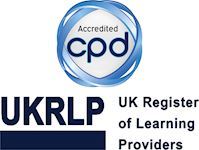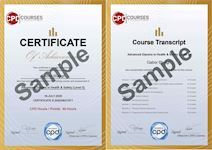Entrepreneurship Course
Advanced Level 7 *Complete Diploma *|*FREE PDF Certificate*|*190 CPD Points| Free Strategic Planning & COVID-19 Courses
Brentwood Open learning College
Summary
- Exam(s) / assessment(s) is included in price
- Tutor is available to students
Add to basket or enquire
Overview
Entrepreneurship
** 3 Courses Bundle**
Entrepreneurship Advanced Diploma Level 7. CPD Accredited Certificate with 190 CPD points. This Entrepreneurship course comes with easy to understand e-learning study materials.
**FREE Strategic Planning Course**FREE COVID-19 Course**
Accredited Entrepreneurship Training Certificate Level 7.
Wouldn’t it be nice to be your own boss, work on your own schedule, and make money doing something that you’re passionate about? Millions of people around the world are living that dream and running their own business. This Entrepreneurship Training course level 3will teach you the basics of Entrepreneurship.
Entrepreneurship - How to start a Fresh Business
You’ll consider if Entrepreneurship is right for you and learn the basic steps of creating your own business. At the end of the course, you’ll have a solid foundation to start your Entrepreneurial journey.
This self-paced programme is available 24/7 providing you with the flexibility to train at the pace, location and time of your choosing. Accredited certificate from a registered awarding body can be claimed on course completion. College registration, tutor support, course materials and additional supporting material are all included in the course fee.
*** 2 Free Gifts included in Entrepreneurship course***
***FREE Strategic Planning Course***
This Free Strategic Planning course covers the following topics:
- Pyramid Structure
- Identifying Our Values
- Creating Value Statements
- Designing Our Vision
- Defining Your Mission Statement
- Performing a SWOT Analysis
- Setting Goals
- Goals with SPIRIT
- Establishing Priorities
- Problem Solving in Action
- Gathering Support
- Making the Change
***FREE COVID-19 Course***
This Free Covid-19 course covers the following topics:
- What Are Coronaviruses?
- What is COVID-19?
- What Are the Symptoms of COVID-19?
- Is it a Cold, the Flu or COVID-19?
- Mild vs Severe Infection
- What Does ‘Community Spread’ Mean?
- How to Protect Yourself from COVID-19
- How to Protect Others from COVID-19
CPD
Course media
Description
Entrepreneurship
What Will Students Learn?
- Assess your own Entrepreneurial capabilities
- Outline and evaluate a business and product idea
- Identify your target market and customers
- Develop your value proposition
- Understand different types of business ownership and structures
- Evaluate franchising and business purchasing opportunities
- Create key business planning documents
- Create financial projections for your business and gather funding
- Create a product development plan, marketing plan, & sales strategy
- Identify ways to protect your intellectual property
- Describe effective ways to brand your product
- Launch and grow your business
- Demonstrate the behaviors of an Entrepreneurial leader
- Find appropriate resources to help you on your journey
Entrepreneurship - Course Syllabus
Unit 1 - Traits of an Entrepreneur
- Traits of an Entrepreneur
- Resources to Consider
- Using a SWOT Analysis
- Advanced Types of SWOT Analyses
Unit 2 - Developing a Business or Product Idea
- Developing Your Product Idea
- Identifying Your Target Market and Customers
- Developing Your Value Proposition
- Developing Your Value Proposition
- Gross Profit Margin
Unit 3 - Financial Plan and Product Development
- The Basics of Financial Statements
- The Income Statement
- The Balance Sheet
Unit 4 - Building a Marketing Plan and Sales Strategy
- Introduction to Marketing
- Consumer and Market Analysis
- Analyzing the Competition
- SWOT Analysis
- Analyzing Distribution Channels
- Creating a Marketing Plan
Unit 5 - Operational Plan
- The Pros and Cons of Home-Based Businesses
- The Roaming Entrepreneur
- Launching the Business
- Setting Up Your Organizational Chart
Unit 6 - Being an Entrepreneurial Leader
- Michael Gerber’s Three Perspectives
- Entrepreneurial Traits
- Creating Financial Projections
Unit 7 - Business Leadership
- Understanding Your Comfort Zone
- Managing Performance
- Onboarding and Orientation
- Managers Vs. Leaders
- Types Of Thinking
Unit 8 – Negotiation Skills
- Practicing Negotiation
- Phases of Negotiation
- Negotiation Made Easier
Unit 9 – Anger Management
- The Assertiveness Formula
- Questioning Skills
- Other Ways of Managing Anger
- Relaxation Techniques
Unit 10 – Stress Management
- Understanding Stress
- Strategies to Manage stress
- Time Management
Unit 11 - Succession Planning
- Defining a Succession Plan
- Strong Leaders and a Strong Organization
- Components of the Plan
- Success Model
Unit 12 - Business Ethics
- Defining Ethics and Morals
- Values Identification
- Why Bother with Ethics?
- Kohlberg’s Six Stages
Unit 13 - Business Etiquette
- Business Etiquette Basics
- The Handshake
- Business Card Etiquette
- The Skill of Making Small Talk
- Do You Remember Names?
Unit 14 - Business Process Management
- The Fundamentals of Business Process Management
- The Vision Phase
- The Design Phase
- The Modelling Phase
- The Execution Phase
- The Monitoring Phase
- The Optimising Phase
Unit 15 Basic Bookkeeping
- Workshop Objectives
- Basic Terminology (I)
- Balance Sheet
- Income Statement
- Revenue
- Cost of Goods Sold
- Expenses
- Basic Terminology (II)
- Accounts Receivable
- Accounts Payable
- Trial Balance
- Plus more
Unit 16 - Kick Start Your Business With Crowd Sourcing
- What Is Crowdsourcing?
- The Crowdsourcing Process
- Types of Crowdsourcing
- Social Media and Crowdsourcing
- Engaging the Crowd
Unit 17 - Global Business Strategies
- Positioning and Pricing
- Marketing
- Selling and Negotiating
- Request for Proposals
- Project Management
Unit 18 - How To Grow Your Business
- Being an Entrepreneurial Leader
- Michael Gerber’s Three Perspectives
- Business Ownership Options
- Business Funding
Unit 19 - Online Tools For Small Business
- Google Docs
- Canva
- Trello
- SurveyMonkey
- MailChimp
Course Benefits:
- Full Tutor Support
- Self paced, no fixed schedules
- Available to students anywhere in the world
- 24/7 Access to the LMS ( Learning Management System )
- Easy to understand quality e-learning study materials
Course Material
All course materials are included in the course price. All your study material will be available on our learning management system for which you will get access once you are enrolled. The material can be downloaded and printed as well.
Our distance learning course materials are specially written for home study and contain a wealth of knowledge in easy to understand language. We use variety of media to help you learn. Your course may use any of the following different media which you can use from home or where ever you choose to study:
- Online course materials
- Question papers
- Additional Supporting Material
- Useful Links
Course assessment
You will be continually assessed throughout the course. Your assignment will be marked by your tutor and independently moderated. The feedback on your assignment will then be sent to you. On receipt of this, you may wish to contact your tutor to discuss the feedback.
Tutor Support
When you enrol on a course with BOLC Courses you are allocated your personal tutor. Tutor’s help and support will be available throughout your studies with the college. He/she will assess your work and will provide you with regular feedback on your progress.
Who is this course for?
Entrepreneurship
No particular entry requirement.
Option 1
CPD Accredited Certificate (issued by CPD Standard Office)
(PDF format)=£30
(Hard copy)=£150+ postal charges
Option 2
Certificate in Entrepreneurship issued by CPD (Courses for Professional Development)
PDF Certificate - FREE
Hard copy - £25 + postal charges
*Postage Charges: National £9, International £15
Questions and answers
Currently there are no Q&As for this course. Be the first to ask a question.
Reviews
Currently there are no reviews for this course. Be the first to leave a review.
Legal information
This course is advertised on reed.co.uk by the Course Provider, whose terms and conditions apply. Purchases are made directly from the Course Provider, and as such, content and materials are supplied by the Course Provider directly. Reed is acting as agent and not reseller in relation to this course. Reed's only responsibility is to facilitate your payment for the course. It is your responsibility to review and agree to the Course Provider's terms and conditions and satisfy yourself as to the suitability of the course you intend to purchase. Reed will not have any responsibility for the content of the course and/or associated materials.



